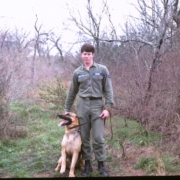Good Fortune and Six Flags over Texas | Healthy Aging Series: S12 E9
I was struck by lightning once. Well, almost.
I was a 20-year-old Airman stationed at Rickenbaker Air Force Base, Columbus, Ohio. I was a Dog Handler tasked with guarding KC 135’s.
Central Ohio, like much of the Midwest, can have some hellacious thunderstorms. During one stormy night, another Dog Handler and I were walking the fight-line admiring the flashes of lightning. Try to imagine how flat the flight-line is, and how much you stand out on that flight-line. There is nothing between you and a lightning strike.
I remember Dutch, the other Dog Handler, raising his hand as if to point to a nearby strike, and immediately having his hand light up. My hand didn’t light up, but I could feel the electricity tingling through it. We called our flight supervisor, who then sent am ambulance, and it seemed like everybody else on the base. We had to go into the base hospital and take off our shoes. They looked for entrance and exit wounds.
Fortunately, there wasn’t any evidence of a strike, and they surmised that we experienced something akin to static electricity. I have known people who were struck by lightning, and their stories weren’t pretty. We both felt fortunate.
This week is Thanksgiving, a day set aside, at least in part, to be grateful for what you have, to feel fortunate.
Stoicism and Good Fortune
Do you feel fortunate? Do you feel that fortune has been good to you? Or maybe not?
Thinking back on that stormy night, on that flight-line in Ohio, I feel fortunate.
Stoicism provides a healthy view of fortune. David Fideler, in his book, “Breakfast with Seneca: a Stoic Guide to the Art of Living,” describes fortune as a roller coaster, meaning that what goes up, often comes down.
“As Seneca points out,” writes Fideler, “what fortune gives you is not truly your own [and] since things swing back and forth, no one should be overly confident when things go well, or give up when things go poorly.” (p. 117)
In Tarot, the Wheel of Fortune card represents the cyclical nature of life and the inevitable changes in life, such as a changes in station, position, or fortune.
Maybe this card was meant as a constant reminder of the fickleness of life, the fickleness of fortune.
How did the Stoics live with this fickleness, with this roller coaster? I believe there are some strategies that we can learn from them to make the most of this Thanksgiving Holiday.
1. Embrace the moment
Marcus Aurelius wrote, “Live in this fleeting instant” (Marcus II.14, III.10). William Irvine in his book, “A Guide to the Good Life: The Ancient Art of Stoic Joy,” explains, “We can either spend this moment wishing it would be different, or we can embrace it.”
Maybe that should be the focus of our Thanksgiving Dinner. Not regretting, not desiring, not wishing, but being thankful for the moment.
My wife and I woke up this morning and our little Kitty, Hansel, was having a difficult time walking. He’s getting older. It would be so easy for us to fast forward to a year or two from now, when he most likely will be gone, and then miss embracing the moment that we have with him now. I lit the gas fireplace, because I know he loves it, and was able to embrace the moment of watching him stretch out on the floor, simply being who he is. Embracing the moment means being thankful for what fortune has given you today, not desiring more, or less, but embracing what is right in front of you.
2. Learn to be happy with what and who you have now.
The Stoics taught, that instead of desiring more things, learn to value the things that you have.
Everywhere you turn, someone is telling you that you need more. I’m not pooh-poohing capitalism, but sometimes enough is enough. The grass isn’t always greener on the other side of the fence. You don’t need the latest contraption. You don’t need the newest iPhone. You don’t need a bigger house, or newer car, or someone else. You need to learn how to appreciate what and who you have.
Seneca promoted the idea of practicing simplicity. The Stoics warned people against becoming enslaved by your possessions. Having more is not always the answer to your happiness.
Years ago, I wanted to write a book entitled, “What happened?” I wanted to follow the lives of people who won a lottery. Several years ago, I worked with an individual who had won the lottery, $1 million, and it changed his life, and not for the better. I would suggest that most of the people who have won the lottery, or who have lots of money, are not happy. I’m sure there are exceptions, but money can’t buy you happiness.
3. Imagine your life without the things you value.
This is a tough one. The Stoics believed in a practice called Negative Visualization. We all have things in our lives that we value, that are important to us. Stoics believed that we should visualize ourselves losing them or not having them. That would include your money, your position, your house, your family, your friends, and anything else that you value.
As an example, when you leave home for work in the morning, and you give your partner or kids a kiss goodbye, at times, you should visualize that kiss as possibly the last kiss you’ll ever give them.
This past month there was a UPS jet crash in our city, where 14 people lost their lives. One was a three-year old child. No one wants to experience that, but understanding the fickleness of fortune should force us to examine what we value and understand that those things could be taken from us. This practice shouldn’t make us afraid to walk out in the street or send our kids to school, but it should help us appreciate them when we have them, which is now.
This Thanksgiving Dinner should be a time to consider the possibility that those who are sitting around your table could be gone at the next Thanksgiving Dinner. Give them a hug now and tell them you love them now.
4. Practice Simplicity
One of the ways that we can embrace the moment, learn to be happy with what we have, and imagine life without the things we value, is to live a life without those things. Irvine recommends that we, “periodically allow ourselves to become thirsty or hungry, even though water and food are at hand, and we might sleep on a hard bed, even though a soft one is available.”
This of course gives me the opportunity to explain, in part, why I love backpacking. It is self-imposed deprivation. You strap 40 lbs. on your back, sleep outside on a cold Fall night, and on a pad that doesn’t come close to resembling a bed. You carry those 40 lbs. up and down hills and experience the pain that gravity imposes on you. Of course it’s fun, but still, there is an element of deprivation in the experience. It hurts so good.
I think your life should be one of divesting itself from the things that you have accumulated over the years.
Thanksgiving Dinner seems to completely contradict this idea of simplicity, but maybe this season can be used as a reminder of how important it is to practice simplicity.
There is a danger of being paralyzed by the prospects of fortune. There is a danger of losing your tranquility and peace by the fickleness of that same fortune. Instead, step into it. Step into your fears and your anxious thoughts about the future and embrace the moment.
Thanksgiving can be a season of getting on the good side of fortune.













